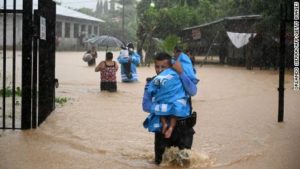
Just last week, countries in Central America; Honduras, Nicaragua, Guatemala, El Salvador, Costa Rica, and Belize, among other Caribbean countries, were hit by Hurricane Eta, category 4.
Hurricane Eta was expected to bring high winds, but the storm lasted for several days in Nicaragua, Honduras, and Guatemala. Amid the COVID-19 pandemic, these countries were not well equipped or prepared for a natural disaster. Hurricane Eta brought high winds and torrential rainfall causing relentless waves and with it, floods that destroyed entire communities.
It is estimated that more than 100 people have died due to the hurricane and so many others are still missing. As it is the case in a small Guatemalan village; “There was a great tragedy here,” village resident Roland Calchak told Reuters. “I lost 23 members of my family. My father, my mother, my wife, my three children, grandchildren, sisters, sisters-in-law.”
It is estimated that around 300,000 people have been left homeless, therefore, their refuge are shelters. Amid COVID-19 pandemic, health authorities in Central America are concerned that cases are going to exponentially increase. Even before the hurricane, countries like Honduras, Nicaragua, and Guatemala, did not have an adequate health system to fight against the virus .
Now, the hospitals in these countries must deal with an extra burden, including other possible illnesses that the storm brought with it, like dengue, cholera, and yellow fever. In Honduras, the shelters for refugees are overflowing, poorly ventilated, and social distancing is nearly impossible. When interviewed, Mauricio Paredes, a member of the Red Cross, claimed that “just bringing people to safe ground has been a challenge… and now it’s a double challenge of not only protecting the people who have been [affected] but also protecting the first responders.”
Mark Connolly, the UNICEF representative in Honduras, says that more people especially children could die in Central America, if urgent aid is not delivered quickly. He expressed that they need essential items like water, purification tablets, water filters, and an overall repair of the neighborhoods most affected water systems. The Red Cross further added that it is planning on handling an operation that will last at least 18 months which will seek to help 75,000 most affected people in these countries.

Recent Comments